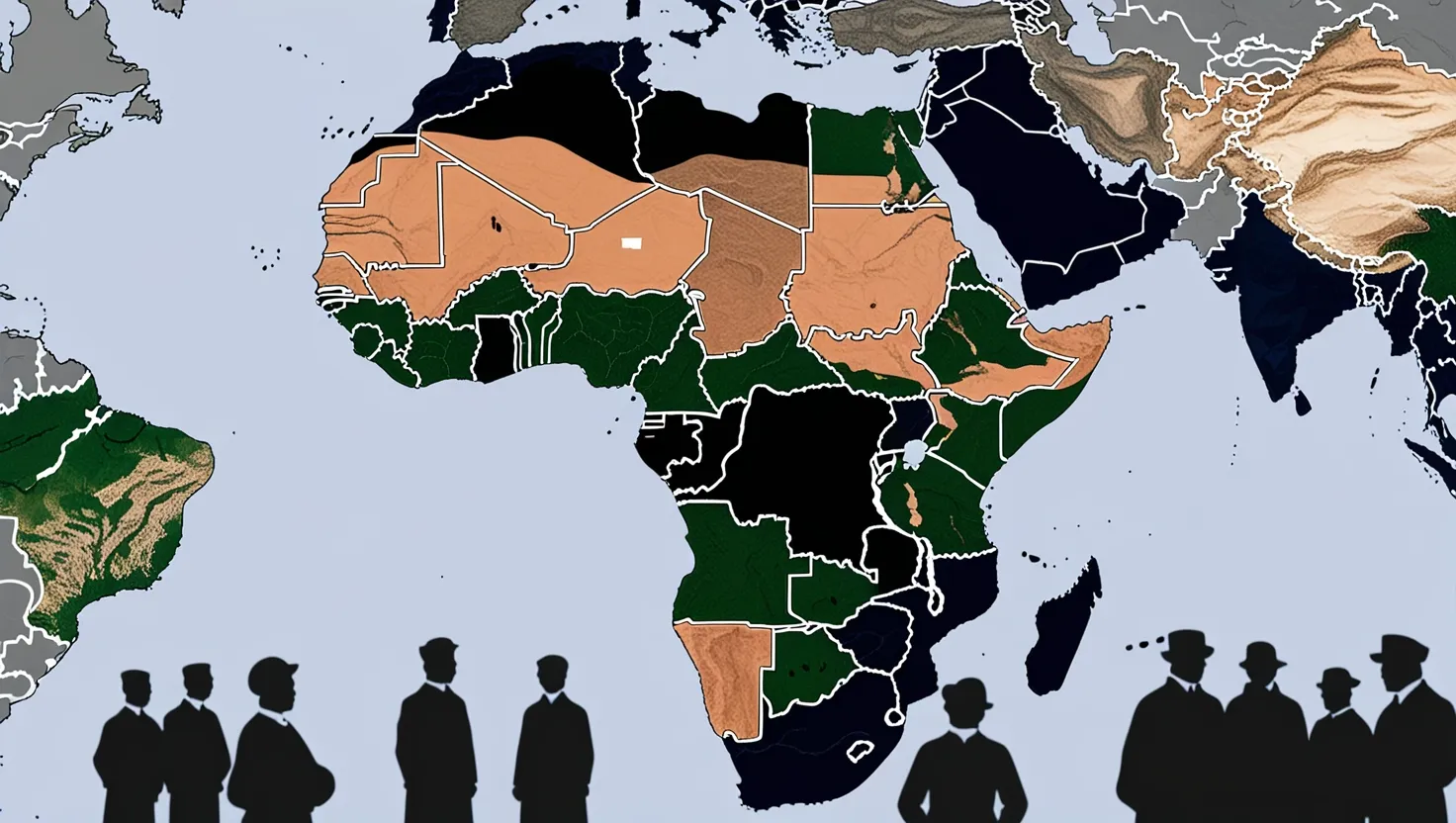The echoes of colonialism still reverberate through our modern world, shaping nations and societies in ways both subtle and profound. As we examine the lasting impacts of colonial rule, we uncover a complex tapestry of decisions and policies that continue to influence global politics, economics, and culture.
Let’s start with the arbitrary borders drawn across Africa. Picture a group of European diplomats huddled over a map in Berlin in 1884, carving up a continent they barely understood with ruler-straight lines. These artificial boundaries threw together diverse ethnic groups and split others apart, creating a recipe for conflict that still simmers today.
“The borders of African nations are the scars of colonialism,” an African proverb goes. How might the continent look today if those lines had been drawn differently?
This disregard for existing cultural and political structures wasn’t limited to mapmaking. Colonial powers often deliberately undermined local governance systems that had evolved over centuries. Traditional leaders were replaced with compliant proxies, disrupting the delicate social fabric that held communities together. The repercussions of this upheaval continue to play out in many post-colonial nations struggling with issues of legitimacy and representation.
Moving from politics to economics, we see how colonial agricultural policies prioritized European markets over local needs. Vast swathes of land were transformed into monoculture plantations, producing cash crops like cotton, sugar, and rubber. This shift away from sustainable, diverse farming practices not only left lasting environmental scars but also created economic dependencies that persist to this day.
“We wanted workers, but human beings came,” Swiss writer Max Frisch once observed about Europe’s guest worker programs. The same could be said of colonial agricultural policies that treated land and people as mere resources to be exploited.
Education, often touted as a positive legacy of colonialism, also carries a more complex history. Colonial schools were primarily designed to create a class of subservient civil servants, not independent thinkers. This approach established educational institutions and curricula that often continued after independence, perpetuating systems disconnected from local needs and realities.
How might education systems in former colonies look different if they had been designed to empower rather than control?
Perhaps one of the most enduring colonial legacies is the establishment of extractive economic systems. These focused on removing raw materials while creating minimal local infrastructure or value-added industries. This pattern of development created economies dependent on exporting unprocessed resources, a model many post-colonial nations still struggle to overcome.
The writer Eduardo Galeano captured this dynamic powerfully: “The division of labor among nations is that some specialize in winning and others in losing.”
As we reflect on these colonial mistakes, it’s crucial to recognize that their impacts aren’t confined to history books. They continue to shape modern nations in tangible ways, influencing everything from border conflicts to economic policies.
Take Nigeria, for example. The artificial borders drawn by British colonizers threw together over 250 ethnic groups, creating tensions that have fueled conflicts and political instability since independence. Or consider the Democratic Republic of Congo, where Belgian colonial exploitation established patterns of resource extraction that continue to fuel violence and underdevelopment.
In India, the British-established education system, while providing some benefits, also created a disconnect between formal schooling and traditional knowledge systems. This legacy continues to influence debates about language of instruction and curriculum content.
Across the Caribbean and parts of Africa, economies still struggle to diversify beyond the cash crop models established during colonial times. The vulnerability of these economies to global market fluctuations is a direct result of colonial agricultural policies.
Even in seemingly stable and prosperous former colonies like Singapore, the legacy of colonial divide-and-rule policies continues to influence ethnic relations and governance strategies.
It’s tempting to view these colonial mistakes as relics of a bygone era, but their consequences are very much alive in the challenges facing many nations today. From ethnic conflicts to economic inequalities, from educational disparities to environmental degradation, the fingerprints of colonialism are everywhere.
“The past is never dead. It’s not even past,” William Faulkner famously wrote. This rings especially true when considering the long shadow of colonialism.
However, recognizing these legacies isn’t about assigning blame or wallowing in historical grievances. Instead, it’s about understanding the root causes of current challenges so we can address them more effectively. It’s about acknowledging the complex historical forces that have shaped our world so we can chart a more equitable and sustainable path forward.
For instance, understanding the artificial nature of many borders could lead to more nuanced approaches to conflict resolution and regional cooperation. Recognizing the limitations of colonial-era education systems could inspire reforms that better integrate local knowledge and needs.
Awareness of how extractive economic models were established could inform strategies for economic diversification and sustainable development. And acknowledging the disruption of traditional governance structures might lead to more inclusive political systems that blend modern and traditional elements.
As we grapple with global challenges like climate change, inequality, and political instability, the lessons of colonial history become increasingly relevant. They remind us of the long-term consequences of short-sighted policies and the importance of respecting local knowledge and systems.
They also highlight the interconnectedness of our world. The decisions made in European capitals over a century ago continue to shape lives across the globe. This interconnectedness underscores our shared responsibility in addressing the lingering impacts of colonialism and working towards a more equitable global order.
“If you want to go fast, go alone. If you want to go far, go together,” says an African proverb. As we confront the complex legacies of colonialism, this wisdom seems particularly apt.
What steps can we take, individually and collectively, to address these colonial legacies? How can nations move beyond colonial-era structures while honoring their own histories and cultures? These are questions we must all grapple with as we work towards a more just and sustainable world.
The mistakes of colonialism serve as a powerful reminder of the far-reaching consequences of our actions. They challenge us to think beyond short-term gains and consider the long-term impacts of our decisions. As we face the challenges of the 21st century, let’s carry these lessons forward, striving to build a world that learns from the past while looking towards a more equitable future.






